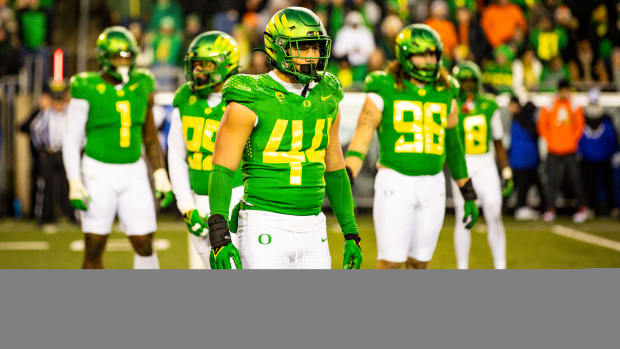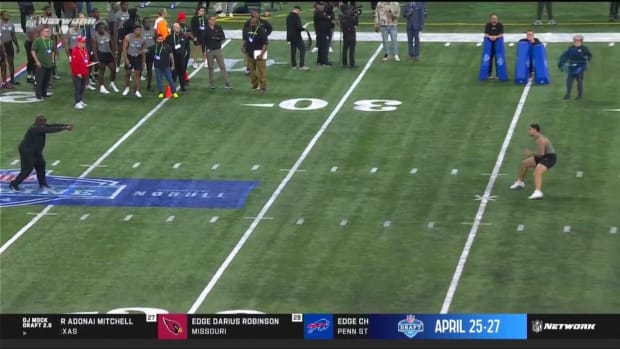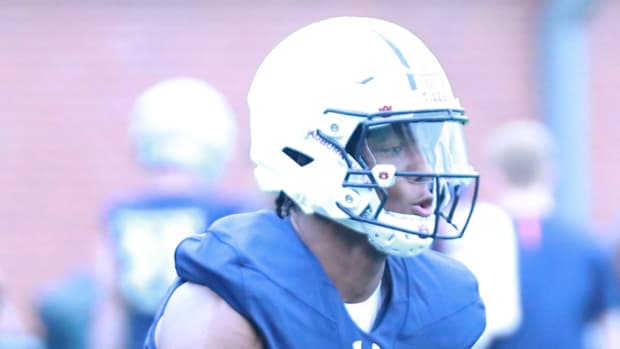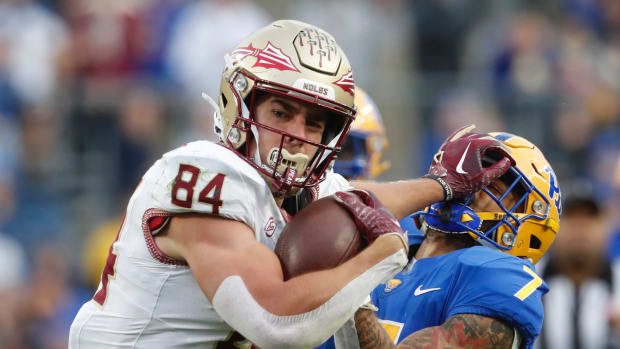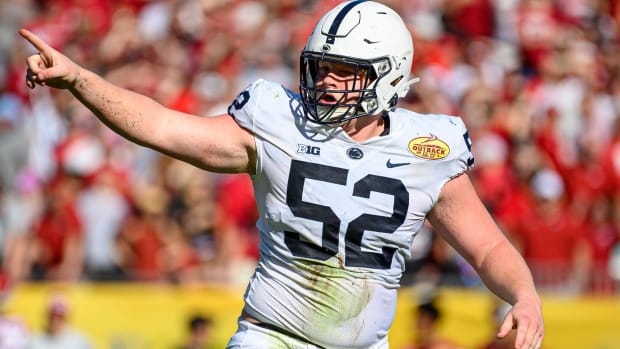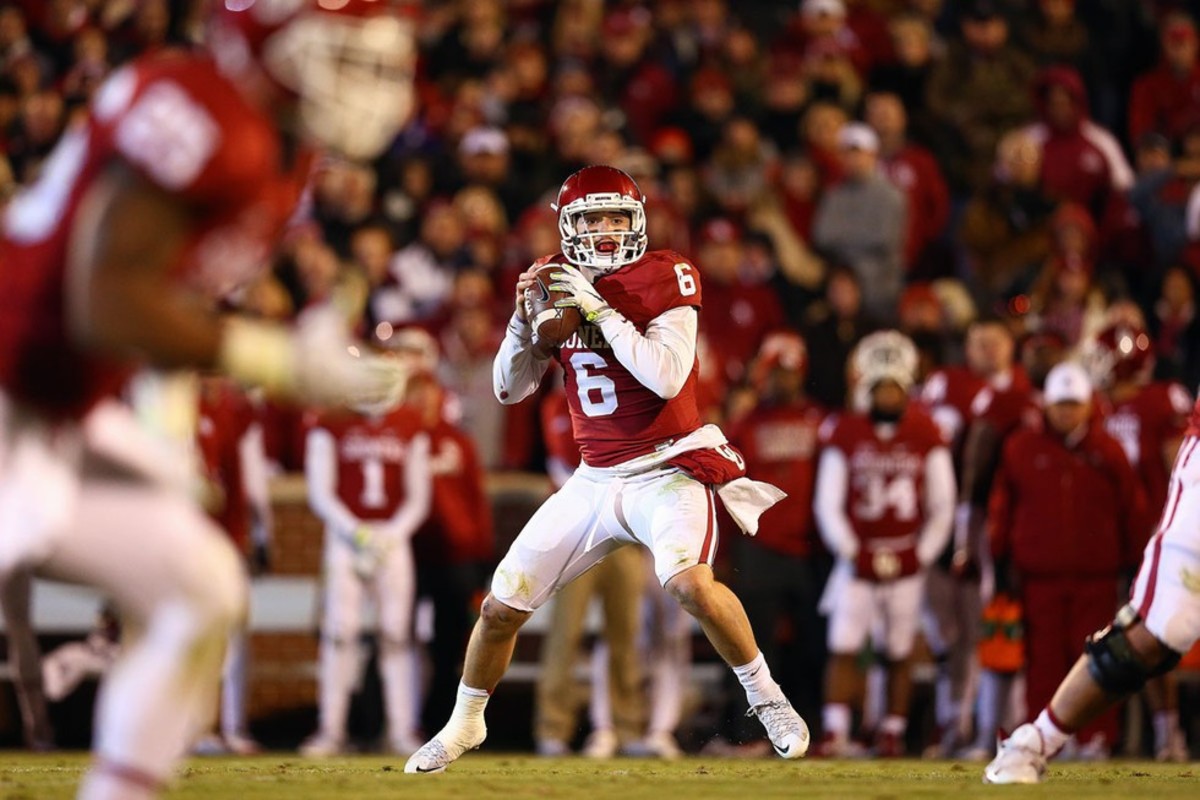
Walk-on, The Wild Side: Baker Mayfield has a price to pay for everyone who has ever doubted the Oklahoma QB
This story appears in the Dec. 21, 2015 issue of Sports Illustrated. Subscribe to the magazine here.
It is possible that you are on Baker Mayfield's list. If you are a doubter or a hater; if you've muttered, yelled or tweeted something critical of Mayfield and the Oklahoma Sooners; if you are, God forbid, one of those who've stood in the way somewhere along Mayfield's strange, sinuous journey, it is possible that you are on his list. Not that he would tell you if you were. He says he has never shown the list to anyone, or even told anyone of its existence until now. "It's been my secret way of keeping the fire burning," Mayfield says.
Oklahoma's 20-year-old junior quarterback, his black cap tugged low, is sitting in a team meeting room on a Thursday afternoon, five days after his team's 58–23 obliteration of Oklahoma State in the final game of the regular season. The win effectively punched Oklahoma's ticket to the College Football Playoff. Mayfield is the star of one of the four teams left gunning for the national championship, and he is explaining why motivation will never be a problem, not for someone whose wounds from slights and insults over the years remain deep and fresh.
Which brings us back to the list. Every so often, Mayfield explains, he will come across something online, hear something on TV or on the field, "negative stuff about me or the team," and he will store it—a story, a quote, a name—in a running log on his phone. "You keep scrolling down the list of things," he says, "and it goes back far. It sums up my journey. It's a reminder of how far I've come."
In January 2014 there were rumors within the Oklahoma program that Mayfield—who had made a splash in the Big 12 the previous fall as a walk-on true freshman who started seven games for Texas Tech and was named the conference's offensive freshman of the year—had transferred, with plans to walk on with the Sooners. None of the coaches, though, had heard from him. None of the players had seen him on campus. One night that January center Ty Darlington was at a house party at an off-campus apartment when, he says, he noticed a "floppy-haired clown" dancing alone, with no one paying attention to him. Darlington thought, Is that ... ?
Yes, it was Baker Mayfield, who days earlier had driven in from Austin with his mother, Gina, to enroll at Oklahoma. Shortly after that party he showed up for his first workout, where he introduced himself to Sooners coach Bob Stoops. "Until that moment I'd heard only rumors, too," says Stoops.
Mayfield spent the 2014 season on the scout team, then won the starting job weeks before the '15 opener. He proceeded to complete 68.6% of his passes for 3,389 yards and 35 touchdowns with only five interceptions, run for 420 yards and another seven scores, lead the Sooners to an 11–1 record and catapult into the Heisman conversation. "The most bizarre story I've ever come across here," says Stoops, who at the time of Mayfield's arrival had an entrenched sophomore quarterback, Trevor Knight, who'd been named MVP of the Sugar Bowl after a 45–31 win over Alabama. "To come here without contacting anyone, under those circumstances? Tells you all you need to know about his confidence—and his fierce determination."
The 2015 Sooners have been cast as the story of a once-proud program returning to glory, of the redemption of Stoops, of an unusually close-knit group that came together after an off-season of turmoil—an upheaval within the coaching staff (eight of nine assistant coaching positions changed) and an on-campus racial incident at a fraternity that tested the bonds of the team (one day in March the team voted to hold a silent protest instead of practicing). They are all of those things, but the story that gets to the heart of this team has a plot out of a Quentin Tarantino revenge flick starring a bandana-wearing, Fu Manchu-sporting gunslinger settling scores with a list of names that he crosses off one by one.
*****
Brett Deering/Getty Images
Mayfield's story makes it easy to cast him as the little quarterback who could. Listed, generously, at 6' 1" and 209 pounds, he looks the part of the gritty overachiever, and the madcap, often improvisational way he plays—"like it's backyard football," says Darlington—also fits the archetype of the undersized grinder who defied the odds. But that story shortchanges Mayfield's natural gifts: It took a lot more than grit for him to turn an inconsistent Sooners offense into a juggernaut that ranked third in the FBS in scoring (45.8 points a game). "He's just purely talented," says Stoops. "He's got a big, quick arm, he can throw the ball from any angle, he's incredibly—incredibly—accurate, and add to that an ability to scramble. Tools-wise, he's got it all."
That's why it's mystifying that so few coaches could see his potential. "I've never told anyone this," says Mayfield, "but one time during the recruiting process, TCU asked me how big my hands were, in a sense that my hands were too small to grip a football. Well, I can confirm that my hands have always been quite big enough to throw a football."
Mayfield snickers. He's wearing a pullover and baggy workout pants. The team is off this week, and he says he has been "bored out of my mind. Yesterday I napped, did some homework, played Xbox, then hung out at Topgolf. I'm a little lost." There's an almost sleepy vibe to Mayfield, but when he recounts the slights he has faced over the years (they go back to middle school, when he "was real short and was the backup," he says), he slides to the edge of the couch and leans forward, his voice rising. "There was a competition going into my junior year," he says, reflecting on his time at Lake Travis High outside Austin, "and coaches were saying that I was too short and too slow." Mayfield not only won the job but also led his school to an undefeated season and a Class 4A state title.
Mayfield grew up a Sooners fan, but as a high schooler he dreamed of playing for TCU. "They were close to home, and they were really successful," he says. After his junior-year success, he seemed set to join the Horned Frogs. Through his senior year TCU coaches invited him to satellite camps all over the state, where they had him throw to other top recruits. "They led me on," Mayfield says. "They said they were going to give me a scholarship. Then a week before signing day they told me that they weren't going to offer a quarterback in my class. Three days later they took a kid out in Temple [a rival high school of Lake Travis's] who we just absolutely destroyed at 7-on-7, and I was pretty insulted. He was 6' 3". That helped me decide where I wanted to walk on. I wanted to go somewhere where I could play [against TCU]."
Thus he blew off scholarship offers from Florida Atlantic, Washington State and New Mexico and made his way to Lubbock, where coach Kliff Kingsbury's Air Raid system proved a perfect fit. In Mayfield's debut, a 41–23 win over SMU, he passed for 413 yards and four touchdowns, and in his third game he led the Red Raiders to a satisfying 20–10 victory over TCU (though he struggled personally, going 21 for 40 with three interceptions). He was 5–0 as a starter when he suffered a right knee injury during a 51–33 win at Kansas in early October.
"After I got hurt, things just took a bad turn, and I lost that connection to [Kingsbury] that was so special," Mayfield says. "It wasn't one thing in particular that hurt [the relationship]. It was just that I got hurt, and I couldn't possibly play. And when I got healthy, I thought was going to jump back into it, right where I left off, [but] it didn't work out that way." Kingsbury reopened the quarterback competition before the bowl game and dragged his feet about putting Mayfield on scholarship. So the star walk-on walked out, surprising everyone. His relationship with Texas Tech became toxic when the school was slow in releasing him to transfer within the Big 12.
"I'm not going to sugarcoat it, I had a big chip on my shoulder when we got to face them," Mayfield says of Oklahoma's Oct. 24 home game against Tech, in which Mayfield passed for 212 yards and two touchdowns as the Sooners rolled to a 63–27 win. Afterward Kingsbury said, "Good game," as he shook Mayfield's hand. "I said, 'Good luck the rest of the year,'" says Mayfield, "and that was it—first time we'd spoken since I'd left."
The following two weeks the Sooners dropped 62 and 52 points on Kansas and Iowa State, respectively, before a trip to Waco to face a Baylor team that had humiliated them a year earlier in Norman 48–14. The Sooners torched the then No. 6-ranked Bears 44–34 in a game that launched Oklahoma into the national championship discussion and Mayfield into the Heisman race (though he would not make the list of finalists). The following week the Sooners faced TCU, and Mayfield, with two touchdown passes and 169 total yards in the first half, staked Oklahoma to a 23–7 lead before leaving the game with a concussion. (The Sooners would hold on for a 30–29 win.)
Looking back, Mayfield says it "was particularly intense" facing the teams that once spurned him. "The same coaches I dealt with are still there. And before all these games, you're out on the field, and while there aren't any words exchanged, you make eye contact and stuff. All that fuels me." Still, he says, "I wouldn't draw up my journey any differently. It's made me as hungry as I need to be for the rest of my life."
*****
Brett Deering/Getty Images
Stoops has a term for the style of play Mayfield has inspired: controlled recklessness. "His personality and the way he plays is very representative of what our team's personality has been this last half of the season," explains Darlington. "We're playing with a lot of energy. A lot of passion. With an edge. We're a little bit pissed off. That's the way [Mayfield] plays the game. Seeking not just to win, but to dominate."
Mayfield extends his influence beyond the football field, too. When the shootings in Charleston, S.C., occurred in June, he sent out a 200-plus word message through his Twitter account that began, "You aren't born hating anybody. You have no opinions when you're born. Somewhere along the line, racism is taught. That is where the problem lies. ... I have now been in 2 different locker rooms with over 210 teammates combined, not one person in either of them have come from the same background. But they work perfectly fine, you know why? Because we have common goals. That's why people need to have the larger picture/common goal of ending Racial Violence."
Baker Mayfield is more, it turns out, than a floppy-haired dancing clown. "As you get to know him, you realize he is genuine," says Darlington. "Everything he says, everything he does, comes from a real place. And that's why he relates to every demographic: Whether offense, defense, black, white, whatever cultural background you come from, he gets you."
"Coach Riley tells me that one of my biggest assets is being relatable to everybody," Mayfield says, referring to offensive coordinator and quarterbacks coach Lincoln Riley, "and I think it's really been my whole process through football that has made that possible for me." As he speaks, Sooners players file in and out of the meeting room; the team is getting together to design its Big 12 championship rings. Mayfield finds himself in a strange, unfamiliar place: No longer an outsider and an underdog, he anticipates a flood of attention in the buildup to the playoff.
The doubters have faded into the shadows. The haters have been silenced. It has been several weeks, in fact, since Mayfield scrolled through his list. But he is certain it will only be a matter of time before he finds something new to fuel the fire. "It's definitely not over—it will never be over," he says with a glint in his eye that feels like an invitation, daring you, almost begging you to doubt him and this Oklahoma team.


